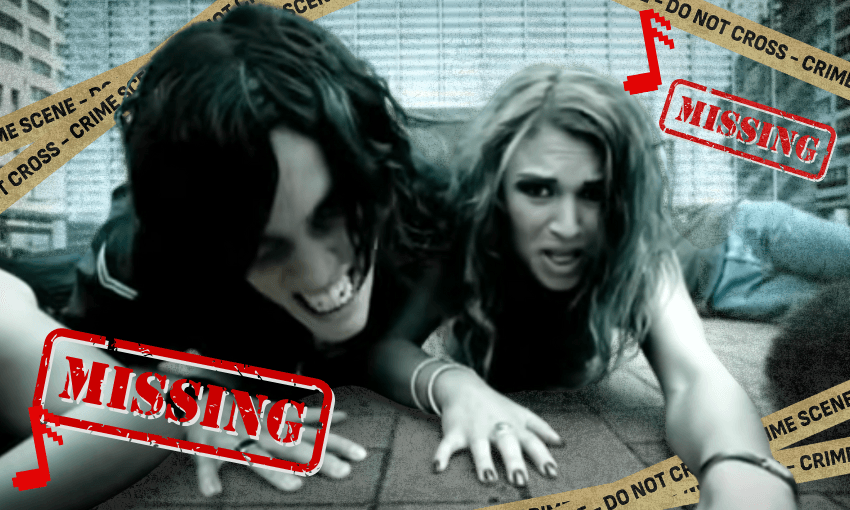On Saturday night, almost a quarter century after the release of their hit single, a reunited Fur Patrol played to a packed out Double Whammy. Did they still have it?
I had homework to do. I opened up Spotify, typed in Fur Patrol. There was ‘Lydia’ at the number one spot, and under discography, Starlifter (1998), Pet (2000), Collider (2004), The Long Distance Runner (2007) and Local Kid (2008). No new albums – thank goodness, I thought. It’s been a hot minute since I’ve listened to Fur Patrol outside of my own belting out of ‘Lydia’ at every karaoke opportunity, and I didn’t need any extra catching up.
In 1995, Julia Deans was tired of playing guitar and singing for a thrash Celtic cover band. She recruited bassist Andrew Bain, guitarist Steve Wells and drummer Simon Braxton, and soon, they performed for the first time at Wellington’s Bar Bodega (RIP). Fur Patrol became Fur Patrol thanks to inspiration from hair removal ads. It was on Christmas eve in 2000 that things took off. ‘Lydia’ hit the airwaves and kicked Destiny’s Child off the top spot on the New Zealand Singles Chart. The rest is history – the band was super hot for a minute, everyone wanted a piece of Deans, the hot, cool, edgy, confident frontwoman who was compared to Garbage’s Shirley Manson and Blondie’s Debbie Harry. The band moved to Australia, presumably to make it big – their subsequent albums were good, but never gained the traction of ‘Lydia’ or its album, Pet. The band called it a day in 2008.
In 2024, Fur Patrol can still sell out gigs. Double Whammy was packed, even before they neared the stage. People were there early to secure good spots, as if Julia Deans doesn’t live 15 minutes away on Auckland’s North Shore. White hair, somehow still thick and glorious, was prevalent in the crowd. Deans, Bain and Braxton entered from stage left. The rocky start of ‘Now’ was met with cheering from the crowd. The two lovely ladies on my left jumped up and down in their sparkly tops, riding tsunami waves of serotonin. One of their partners guiltily admitted to not really being a fan, just a chaperone.
“I have come to hunt you down and drop you in the deepest ocean,” sang Deans in her kind of growly melodic voice, as if we’d only just survived the turn of the millennium and tomorrow morning we’d be slipping on huge sunglasses which made us look kind of like flies. On my right, someone with a French twist and a long suede coat shot daggers at everyone who dared stray from their previously bagsed spot. Maybe because men making their way through the crowd had the tendency to touch the waists of strangers.
After many songs from the albums Pet and Collider (I can confidently say this thanks to my homework), Deans looked at Braxton and said “Lydia?” Two women in front of me locked eyes and smiled. The crowd seemed to press in tighter. This particular four minutes and 12 seconds is the reason many people went, though they cheered and clapped and heckled and danced throughout. The bass began, then the drums, and finally Deans, accompanied by every woman in the room. With so many backup singers, Deans decided not to sing about half of it. On one hand I was peeved because I came to hear her, not the tuneless shouting coming from all directions. On the other hand I think it was generous and graceful of them to play ‘Lydia’ at all, since it must be annoying as hell to have one song overshadow entire careers in music. At one point, Deans gently mocked the audience, pitching her voice higher to say, “We like your old stuff better than your new stuff.” But she didn’t seem toooo salty about it.
Nostalgia touring has been fairly condemned by Duncan Greive – “the band has grown in ways the audience surely didn’t appreciate,” he wrote of 90s shoegaze band Ride’s performance at the Powerstation last month. I too have had some yuck experiences, which felt all too much like watching my grandpa on stage (Television), or watching someone who didn’t want to be watched but had spent all their money on booze and drugs (The Strokes). In August, Julia Deans turned 50 and I couldn’t help but wonder if this would all be a bit tragic.
Luckily, my high cringe reflex was not activated. Julia Deans is still Julia Deans, even if some of her banter went down “like lead” (her words). Admittedly, I didn’t pay much attention to the other band members – the curse of being alongside such a woman – but the songs held together well. The gig sounded like a proper ROCK show, thanks to sound engineer David Wernham, who apparently spent a week tuning the PA to the venue (I did not know a PA could be tuned but here we are). There were a couple of fumbles, and an awkward 30 seconds where Deans kept restarting a song, “I fucking forgot how it goes,” she said, laughing.
After the crowd cleared out, the floor was littered with squashed beer cans, plastic cups and one chip packet. Outside, a sweaty Deans was surrounded at the merch table. She had, after all, offered up hugs, thanking the crowd “for coming along, dancing and making us feel loved”. No one pretended it was the year 2000. There was no desperate clutch at fading youth or fame. Instead, it felt like an exchange of appreciation between band and fans. A woman pulled out an old photo of Deans clipped out of the newspaper, and showed it to her friend. “She’s still so beautiful.”



